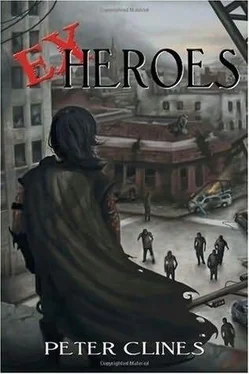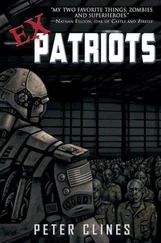No. Neither of the Pedros struck me as ruthless enough to run the gang, either. Good lieutenants, not real leaders.” Stealth looked at the map. “Is there anyone in the next level who might fit?”
“The next level is a hundred guys. Probably twice that if they’ve gotten as big as you’re saying. Without a real description it could be anyone. Hell, Peasy could be someone who just moved in and took over.” He swiped at the map and knotted his fists once or twice. “What?”
“It pisses me off,” he said. “I used to know the SS backwards and forwards. We’ve downgraded them as a problem for so long we don’t know a fucking thing about them anymore.”
“Thus, the recon,” said Stealth. “A small team. Two at most.”
“Just us?” asked Gorgon. “Or were you thinking of civilians?” She shook her head. “After Zzzap, St. George and I are the fastest. We are also the best suited to operating without support.” St. George raised an eyebrow. “How tough do you think this is going to be?” Stealth ran her finger across the map. “Four and a half miles each way. Keeping a low profile, that is a full day of travel with no backup.
With actual reconnaissance time, we will be gone for almost two days.” Danielle tapped the map. “Why not just have Barry do another fly-over? Faster and easier.”
“Since he cannot hold anything,” said Stealth, “we cannot get images. Everything would come down to his memory, descriptive ability, and how long it would take to debrief him.”
“Plus I’m not exactly subtle,” he said with a wink. “Hard to do covert ops when you’re brighter than the sun.”
“We need to see what they are doing when they believe we are not observing, get a solid idea of their forces, and perhaps discover who this Peasy is.” The pen Josh was twirling between his fingers clicked on the table. “Oh, hell.”
“What?”
“Not Peasy,” he said. He looked up at them. “Pee-Zee.” Barry tilted his head. “What?”
“I was thinking about the virus and how it doesn’t mutate, and that got me thinking about the contagion and all the news announcements they kept making to keep people updated, and then it just hit me—”
“Pee-Zee,” repeated Stealth. St. George glanced at their faces. “Am I the only slow one?”
“Patient zero,” said Josh.
It’s What’s Inside That Counts
THEN
Even with the shortage of pilots these days, we rated air travel. The rest of the team was in a passenger plane, sitting in real padded seats. I was on a bench, leaning against the interior wall of a C-130J Hercules, strapped into a fivepoint harness. Cerberus was broken down into over a dozen components and stored for transport. The crates were strapped to the sides of the plane, heavy Anvil cases mounted on solid wheels. With the way things were collapsing across the country, I wasn’t about to let it out of my sight.
The Cerberus Battle Armor System took five months to design and another four to build. At least six weeks of that was waiting for parts. Plenty of people had been working on exoskeletons before me. There was the Hardiman stuff the Navy tried in the sixties. Just before everything fell apart, Hugo Herr at MIT had one. UC Berkeley had their Bleex rig and the Hulc. Sarcos Incorporated had a great one. And all I had to do was flash my DARPA card, say “National security,” and I got to look at the blueprints and software for all of them, whether they liked it or not.
Then you can add in all the optional extras. The Army’s Future Force Warrior system. Interceptor body armor. The latest Taser designs. Motion-sensor targeting programs. All this technology was just sitting around, waiting for one clever woman to put it all together. Yes, I stole from the best. New York’s been lost. No one wants to say it, but there it is.
The entire city’s gone. Boston too. And Chicago. Washington DC’s hanging on by a thread, but I understand the president and his cabinet were evacuated to NORAD over a week ago. The west coast cities seem to have fared a little better, probably because they’ve got more sprawl and less concentration. One of the last decisions made by the DOD was to ship me and the suit out west. I was supposed to team up with some of the “superheroes” out there and be a visible symbol of government power, action, and safety in Los Angeles.
The rest of the Hercules was taken up by a platoon’s worth of Marines. I say “worth” because they were a patched-together group, a few surviving squads, individuals, and raw recruits out of basic that had been reorganized to make a functioning unit. I knew soldiers tended to be younger than most people thought, but seeing a bunch of kids all still in their teens drove it home. They were loud and boastful and bragging. And they were white-knuckle scared. Almost two thirds of the current enlisted US military servicemen were dead. Half of them were still walking.
Our plane tilted and everyone shifted their feet. One of the flight crew spoke for a few minutes to the platoon sergeant, a tall, heavy-set man who spent the flight checking his troops. He nodded to the airman and walked back to me.
“Little course correction,” he said. His voice was loud and brash over the roar of the engines. He was ten years older than most of the men and women following him. “Is there a problem?”
“No, ma’am, there’s been a development at Burbank. We’re diverting to Van Nuys.”
“That’s further into the Valley, isn’t it? We’re going deeper into held territory?”
“Technically, yes, but the airport is a safe zone.
Approximately two hundred civilians and staff there.”
“How much longer?”
“Thirty minutes.” He held out his hand. “Staff Sergeant Jeffrey Wallen.” I nodded at his nametag. “I know.”
“I’ve been meaning to compliment you on your outfit.” I’d been issued a flak jacket with no tags and a helmet. I wore them over my street clothes. “Well, nothing says military consultant like the Red Sox and digital camos.”
“You a fan?”
“An ex-boyfriend left it in my apartment. It’s got long sleeves and I don’t care what happens to it.”
“No love lost?”
“None.”
“When’d he dump you?”
“How do you know I didn’t dump him?” The staff sergeant shook his head and sat down next to me.
“Nobody dumps somebody back home. It’s always the other way around.” I smiled. “Seven months ago.”
“That’s cool,” he nodded. “Go for it, Wall!” A few yards back in the plane, one of the Marines sent a double thumbs-up our way and the others hooted and cackled.
It was the happiest, the most normal they’d looked for the whole flight. Wallen stared him down, but it was a friendly stare. “Sorry about that.” I shrugged it off. “They’re just blowing off steam.”
“So, you’re on the Cerberus team, huh?”
“You could say that, yeah.” He nodded. “You been with them a long time?”
“Why do you ask?”
“I’m just wondering about this guy,” he said with a shrug.
“What do you know about him?”
“Who?” He jerked his thumb over at the crates. “Danny Morris,” he said. “The guy in the suit.”
“I’m sorry …?”
“A bunch of the guys are just kind of wondering why a lab professor suddenly decides to be a government-sponsored superhero, y’know? Especially someone with no service history.” I bit my tongue and nodded. “Makes sense.”
“So how much do you know about him?” I toyed with a couple crude answers, but settled on “Quite a bit.”
“Like?”
“Genius IQ. Confident. The only person who completely understands how the suit works and can use it with any degree of competence.”
Читать дальше












